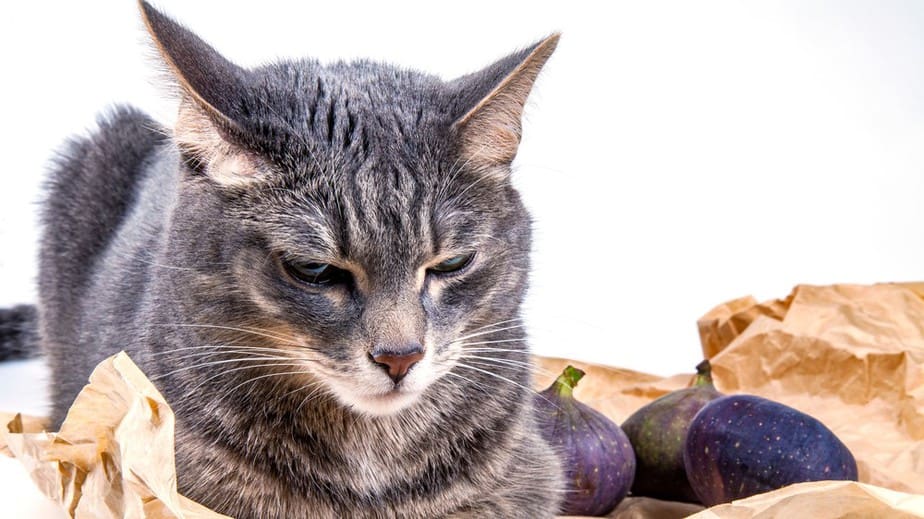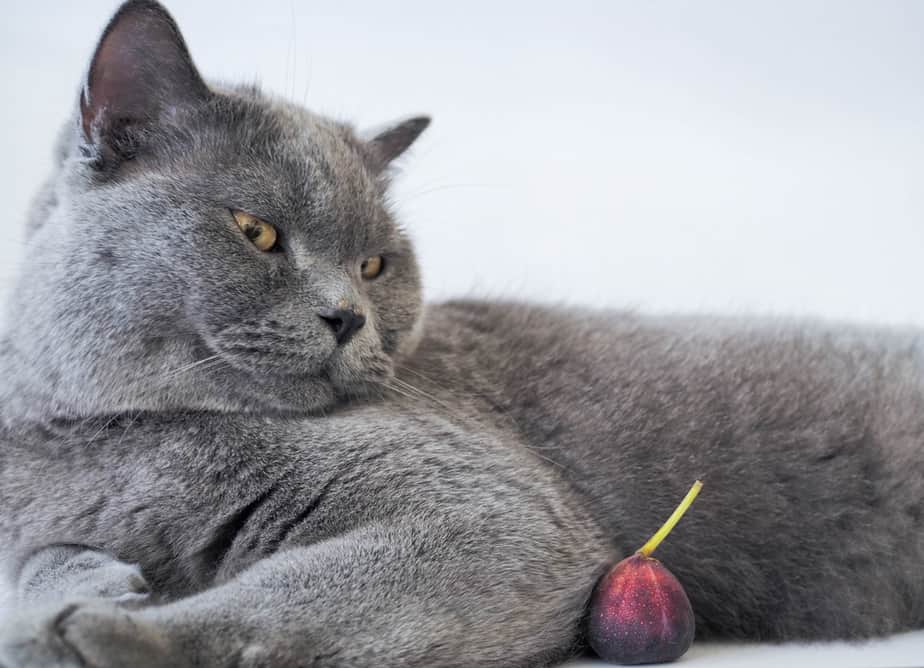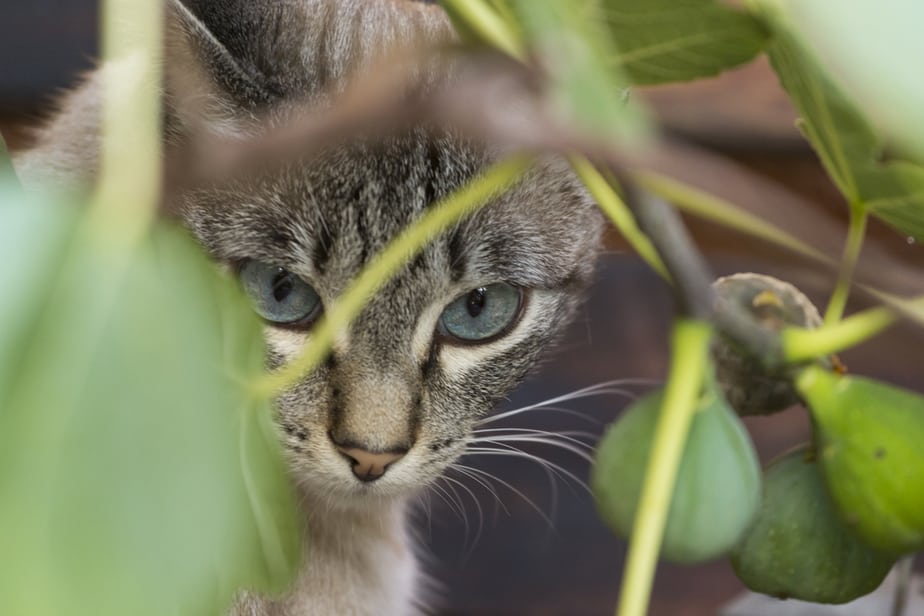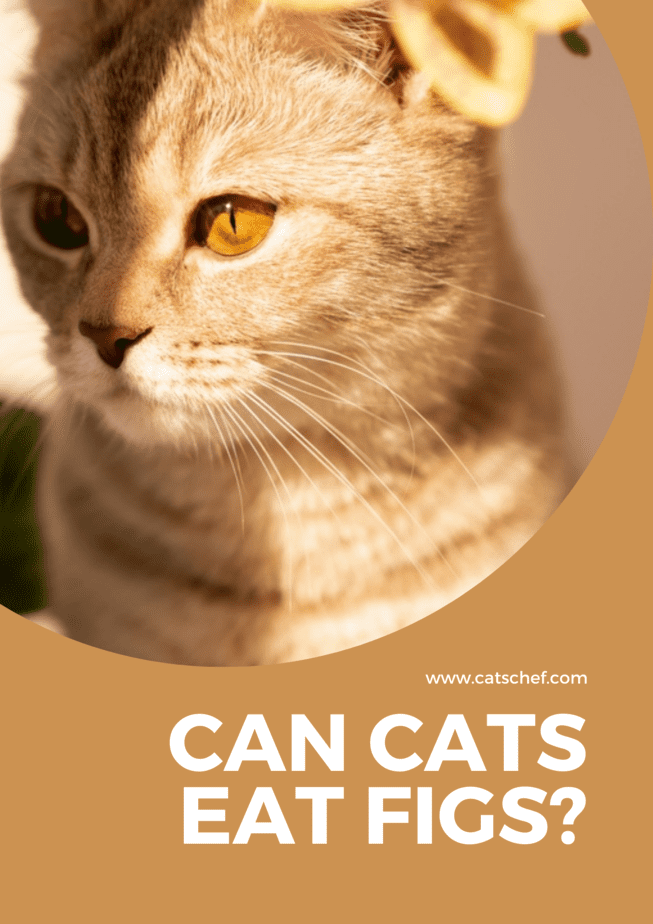📖 Table of Content:
We know cats are carnivores, but they do occasionally take to fruits and veggies when offered from our plate. But can cats eat figs?
Although we all call it a fruit, a fig is actually a collection of small blooms growing inside an edible casing. Because figs are so sweet, they’re often used in desserts, however, they can also be used in savory meals and eaten whole.
Because the fruit is so delicate and it can’t stay fresh for a long time, people often dry it and store it that way. Due to their limited season, fresh figs can get expensive. However, canned, dried, and frozen ones are far less pricey and can be found on the shelves all year round.
Does this mean cats are safe to munch down on some figs?
Can cats eat figs safely?
Figs are toxic to cats, and if your cat eats a fig or a piece of a fig plant, she may develop fig toxicity. They contain enzymes and other compounds that cause low to moderate toxicity.
Cats are curious creatures, and they may eat fig fruit or play with the decorative plant’s leaves, potentially causing poisoning. Loss of appetite, drooling, vomiting, and diarrhea are some of the symptoms of fig poisoning.
The enzyme ficain is not only present in fig leaves and stems, but also in the fig’s skin and pulp. The levels of ficain and another compound, psoralen, are lower in fully ripe figs, but immature fruits can have significantly higher levels.
Because fig poisoning in cats is usually minor or moderate, your cat will most likely recover completely after tasting a fig plant. However, digestive problems can last for days after consumption, and your cat may require a bland diet, such as boiled chicken and rice, or prescription food and medication.
Other hazards associated with cats eating figs
One of the reasons humans appreciate fruits is that they are often high in sugar. Cats, on the other hand, do not require carbohydrates because they are an unneeded dietary component.
Because cats are unable to absorb carbs, even good sugars present in fruits can be hazardous to your cat. This causes a carbohydrate build-up, which leads to fat storage. We believe that putting a few extra pounds on our pets makes them more huggable, but we’re sure your fluffy pal will disagree.
Weight growth could place additional strain on her joints, potentially leading to arthritis in her later years. In addition, felines with high cholesterol are at risk for heart disease and stroke.
Furthermore, figs can irritate her skin, resulting in allergic dermatitis. Sneezing, rashes, wheezing, and a stuffy nose are some of the symptoms of this medical disease.
What about fig trees and leaves?
Figs are wonderful delicacies and make lovely houseplants too, but they might be dangerous to your cat. Ingestion of any portion of a fig plant, however slight to moderate, can cause felines discomfort and digestive trouble, necessitating medical intervention.
Proteolytic enzyme (ficain) and psoralen (ficusin), both poisonous chemicals found in fig leaves, can destroy the DNA of your cat’s cells. The milky sap generated by the plant’s leaves and branches contains the highest concentration of these chemicals.
For her safety and your sanity’s sake, keep your cat away from fig trees and leaves. It’s a challenging task, but veterinary expenses may be devastating.
Can cats eat figs that have been dried?
In most situations, it’s the skin of the fruit or the plant on which it grows that is harmful to felines, not the ripe fruit. Figs are an example of this. Although the ripened fig fruit isn’t truly dangerous to cats, it’s still not a good idea to serve it to them.
Instead, the fig plant, particularly the sap, is poisonous to cats. Your cat may develop rashes and skin irritation if it comes into contact with a fig plant. If your cat eats this plant, she may develop diarrhea, vomiting, drooling, and other symptoms.
Although dried fruits like sultanas are beneficial to humans, you should be aware of the risks they represent to cats. While they’re good for us, they’re bad for your pet’s health. Cats are picky eaters, but this trait could work in their favor when it comes to dangerous foods like raisins, or in this case, figs.
Food poisoning in cats is extremely uncommon. It’s more of a canine problem. Because cats are less trusting of new meals than dogs, you generally don’t have to panic. But if you’re still wondering whether cats can eat dried figs, the answer is no.
Can cats eat fig Newtons?
Fig Newtons are fig-filled pastries, and extrusion-made fig rolls are the most popular. In addition to fig paste, they contain whole wheat grain flour, sugar, baking soda, soy lecithin, artificial flavor, soy, canola oil, pail oil, and other ingredients.
Fortunately, the fruits used to make the fruit paste are ripe and contain little ficain or psoralen. Your kitty companion won’t be harmed by even a small amount. However, it’s the other host of ingredients that’ll make you want to avoid feeding them to your cat and instead choose other healthy options.
If you weren’t aware, sugar and starches are not good for your feline friend. And Fig Newtons are high in sugar, which isn’t necessary for cats because carbohydrates don’t play a role in their bodies. Any excess of these can’t be properly digested and will therefore be detrimental to your fluff.
If your cat’s carb intake exceeds the recommended amount, obesity, diabetes, and dental problems may develop. Another source of worry with store-bought desserts is the presence of various preservatives and sweeteners.
These are included for flavor, color, and longer shelf life, but many of them are harmful to your pet if swallowed. Xylitol, an artificial sweetener, is deadly to cats. It can cause a variety of serious issues when it interacts with your pet’s digestive tract.
It immediately enters the bloodstream and triggers the production of insulin by the pancreas. Hypoglycemia, or low blood sugar, is the effect of this. If left untreated, this can result in death. So, cats can definitely not eat fig Newtons, as there are just too many adverse consequences.
In summary
It can be tough to resist giving your furchild everything she desires when she bats those beautiful eyes at you. You simply want to lavish as much attention on her as possible! However, too much munching can rapidly lead your cat to the vet, and we all know how much that can cost.
We made sure to clarify the whys and hows in order to answer your question, “Can cats eat figs?” The point is that they’re toxic to cats, together with the leaves.
This poisonous fruit won’t do them any good. Many chemicals and artificial sweeteners found in store-bought desserts like fig Newtons are toxic to cats.
Read more: Can Cats Eat Jackfruit? Do You Know Jack About This Fruit?




